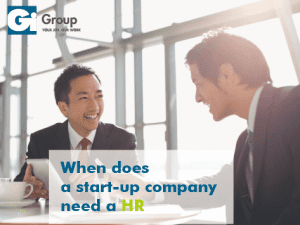For some start-up companies, when founders start to think about the value of HR, HR usually does not serve a very important role to the company. At this stage when the company is just established, the founder of the company generally focuses on their products and business growth.
It’s certainly possible and very common for start-up companies of any sort to reach 50 employees with no dedicated HR personnel. Even for some companies that actually have a HR team, they simply assign one single worker to that position. Usually, this person performs very basic HR functions such as managing the employees’ payrolls.
Actually, HR does far more than just issuing payroll checks. Without an experienced HR person onboard, it’s tough to know what you need to do. When the companies grow bigger and bigger, the founders begin to realize the need and importance of HR. Here are some general guidelines to help you think about when to use a consultancy, or when to hire a full- time HR professional, or even more, when you might need both!
2-25 Employees
At this stage, the most important tasks are “recruitment” and “communication”
The “recruitment” mentioned here is not simply to recruit enough people to work, but to strictly control the recruitment process to ensure the matching of personal drive and ability. Everyone should fully agree with the entrepreneurial story told by the company and share common pursuits. So that the founder does not need to put all his/her energy on how to “drive” everyone, but can work with his/her staff on making his/her entrepreneurial story a success.
To achieve this, the founder need to spend lots of his/her time on recruitment process.
And the communication here means everyone understands each other and communicates continuously and honestly. Within 20 people, it is entirely possible to organize well by relying on the intimate relationship of mutual familiarity and trust. Even if there is confusion, it might greatly not affect the overall organizational effectiveness.
This kind of close relationship is established by keeping the information transparent at all times, being able to communicate face-to-face in time when encountering problems or conflicts, and organizing effective team building activities to promote in-depth understanding.
With this team size, the cost of establishing an intimate relationship will not be higher than the cost of establishing rules, processes, and mechanisms.
25-50 Employees
At this stage, there are many administrative tasks that business owners need to outsource. As the company grows, it will be really hard for a person to finish both the business and the HR workload by oneself.
Maybe the founder would like to hire an in-house HR at this moment. However, compared to the salary of in house HR, outsourcing maybe is more cost effective at this stage. A good outsourcing partner can offer the best options to your company based on the number of employees and the project you going to kick off.
50-100 Employees
When your company has over 50 employee, founder should stop thinking about do everything by him/herself. By trying to save money or expecting that your accountant or administrative employee can manage this level of complexity and regulation, you are indeed putting your company at risk. Therefore, it is time to hire a HR who has relevant training and solid experience before.
At this stage, the most important tasks are “selection and performance management of mangers” and “onboarding training”
Why does it seem that the most important thing in a company’s development stage is no longer recruitment? Recruitment is of course important, but it will be more and more difficult for founders to fully control the results of recruitment. On the other hand, recruitment will shift to standardization, middle-level managers will have an impact on decision-making. At this time, the best thing founders need to do is how to lead or manage the middle managers.
“Onboarding training “can also be considered as a kind of internal communication. the proportion of new employees at this time is relatively large, and there will be an influx in a short period of time. Their effectiveness in obtaining information from regular employee meetings is much lower than that of existing employees. On-boarding training can speed up their acquisition of effective information from regular internal communications. The induction training here can be very simple, a lunch meeting, or a Q&A session will be helpful already.
100+ Employees
When the company has more than 100 employee, you must start to consider building an HR system. At this time, if there is no HR that can do strategy and structure things, you must consider hurrying to recruit one.
We will further discuss about how to build a HR system. Stay tuned!
***The contents and information in this article are for reference only. We do not represent any legal advice.
***If you want to reprint the article or content, please contact us or attach a link to this article and indicate the source of reprint.











